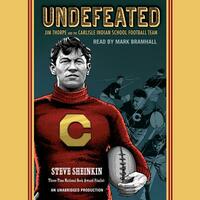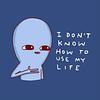Take a photo of a barcode or cover
This was my first Steve Sheinkin book even though he's been winning awards for his nonfiction for young adults for years. It's incredible to learn about Jim Thorpe and the Carlisle Indian School, but for football fans, the history of football is also incredibly appealing. He blends the stories seamlessly.
I was given this book a few years ago by a family from my school during the book fair, and I was very excited, partly because I was already a big fan of Steve Sheinkin but also because I have only ever known the basics about Jim Thorpe or the beginnings of American football. It did not disappoint.
The thing that Sheinkin does remarkably well that sets him apart, beyond just the obvious one of writing good histories for younger audiences, is thread various points together from American history in a way that is very perceptive and intriguing. For example, this book, without having to go off on tangents, seamlessly brings together the fraught question of Native American boarding schools, the personality of Jim Thorpe, the rise of American football, Teddy Roosevelt, and Dwight Eisenhower. Intrigued? Read this book.
One question that occurred to me while reading this book is whether my year teaching at an urban charter high school in Milwaukee to 100% African-American students was analogous to the way that a Native American boarding school (about which I teach my 8th graders every year) was run. I mean, there are plenty of obvious differences, like no one was being taken away from their home thousands of miles away, there were no boarders, no corporal punishment, and the list goes on. But what I mean is, how much was I a part of teaching students in a way that was culturally inappropriate? I certainly tried not to do that, as did the whole staff as far as I know (all of the teachers were white when I was there, not by choice, but that’s just what happened), but maybe historians will look back on that and see some connections? Who knows? It’s certainly something worth my time to think about to help inform the way I live my life going forward. Can someone of almost a completely foreign culture in any appropriate way teach someone of a different culture? This is also something I have considered a lot academically and personally when I have researched, written about, and interacted with Christian missionaries. A quote I will be thinking about for a while from near the end of the book by Luther Standing Bear is a good place to leave it: “While the white people had much to teach us, we had much to teach them, and what a school could have been established upon that idea!” (pg 227)
I will eventually read all of Sheinkin’s books, and the more students I can get to read them as well, the better. I already have gotten a few of my 8th graders hooked on him.
The thing that Sheinkin does remarkably well that sets him apart, beyond just the obvious one of writing good histories for younger audiences, is thread various points together from American history in a way that is very perceptive and intriguing. For example, this book, without having to go off on tangents, seamlessly brings together the fraught question of Native American boarding schools, the personality of Jim Thorpe, the rise of American football, Teddy Roosevelt, and Dwight Eisenhower. Intrigued? Read this book.
One question that occurred to me while reading this book is whether my year teaching at an urban charter high school in Milwaukee to 100% African-American students was analogous to the way that a Native American boarding school (about which I teach my 8th graders every year) was run. I mean, there are plenty of obvious differences, like no one was being taken away from their home thousands of miles away, there were no boarders, no corporal punishment, and the list goes on. But what I mean is, how much was I a part of teaching students in a way that was culturally inappropriate? I certainly tried not to do that, as did the whole staff as far as I know (all of the teachers were white when I was there, not by choice, but that’s just what happened), but maybe historians will look back on that and see some connections? Who knows? It’s certainly something worth my time to think about to help inform the way I live my life going forward. Can someone of almost a completely foreign culture in any appropriate way teach someone of a different culture? This is also something I have considered a lot academically and personally when I have researched, written about, and interacted with Christian missionaries. A quote I will be thinking about for a while from near the end of the book by Luther Standing Bear is a good place to leave it: “While the white people had much to teach us, we had much to teach them, and what a school could have been established upon that idea!” (pg 227)
I will eventually read all of Sheinkin’s books, and the more students I can get to read them as well, the better. I already have gotten a few of my 8th graders hooked on him.
It wasn’t bad actually even though I gave it a 2/5. This book was made for 14 year olds and for history/nonfiction fans and I am neither of those sooooo. However, the history was pretty fast paced and I ended up enjoying it as well as acquiring a few quotes.
(P.S. I had to read this for school so I think that plays into the rating)
(P.S. I had to read this for school so I think that plays into the rating)
informative
Sheinkin does it again in this gripping narrative nonfiction about Jim Thorpe and the Carlisle Indians. All of the football stuff did start to drag for me, but I can see a young sports fan eating up the riveting story of the beginnings of football and the Carlisle team's journey to being a top team. I thought I knew a lot about how Native Americans were treated, but boy did Steve pull out some new horrible info to share. He didn't shy away from talking about all the racism, abuse, and more that these Native American children faced becoming "civilized." It was eye-opening and heartbreaking. It's not the Oklahoma history I was taught. From those struggles to the Olympic medal controversy (which I also had no idea about) this was an overall fascinating read. And the end where there's a call to action about the current use of racist sports team names?!? You go, Sheinkin! I learned a lot from this book and can see many a reader, young and old, enjoying and learning from it as well.
Pretty good. I feel like it was a bit surface level. Might look at a different biography about Jim Thorpe. Pretty quick read and I think would work well for nonfiction book clubs
informative
fast-paced
I struggled with the writing style a little bit at first, but I got into it overall pretty quickly, and wow, the story. And the wealth of pictures really brings the reality of the book home. I enjoyed it a lot. Really neat book.
Jim Thorpe was likely the best football player to every play the game. He also won the decathlon and the pentathlon in the 1912 Olympics in Sweden to have it all stripped from him because he wasn't white. This memoir about this amazing athlete is an important book to read to understand a lot about our jaded US history. What a man!
3.5 Stars.
The Good: Author Steve Sheinkin is a master when it comes to writing narrative nonfiction. He presents historical figures and incidents from many different angles and crafts his stories in a way that makes them exciting and engaging. In this respect, this book is masterful.
The Bad: It's hard to tell exactly what the subject matter of this book is. Is it Jim Thorpe? Is it the Carlisle School's football program? Thorpe's relationship with Pop Warner? The book tackles it's subject matter from so many angles and provides so much backstory that it really does have trouble defining exactly what it's purpose is.
That said, the extensive backstory is characteristic of Sheinkin and is part of what makes his books so dynamic. This story is clearly complex and there's a lot to it. Unfortunately, because the book tries to cover so much it just looses focus. Not badly enough to deter most readers, but enough for me to not love it for our Mock Newbery picks.
Even with that, it's a heck of a ride. Fascinating stuff.
The Good: Author Steve Sheinkin is a master when it comes to writing narrative nonfiction. He presents historical figures and incidents from many different angles and crafts his stories in a way that makes them exciting and engaging. In this respect, this book is masterful.
The Bad: It's hard to tell exactly what the subject matter of this book is. Is it Jim Thorpe? Is it the Carlisle School's football program? Thorpe's relationship with Pop Warner? The book tackles it's subject matter from so many angles and provides so much backstory that it really does have trouble defining exactly what it's purpose is.
That said, the extensive backstory is characteristic of Sheinkin and is part of what makes his books so dynamic. This story is clearly complex and there's a lot to it. Unfortunately, because the book tries to cover so much it just looses focus. Not badly enough to deter most readers, but enough for me to not love it for our Mock Newbery picks.
Even with that, it's a heck of a ride. Fascinating stuff.






